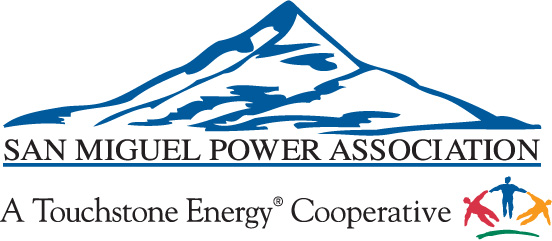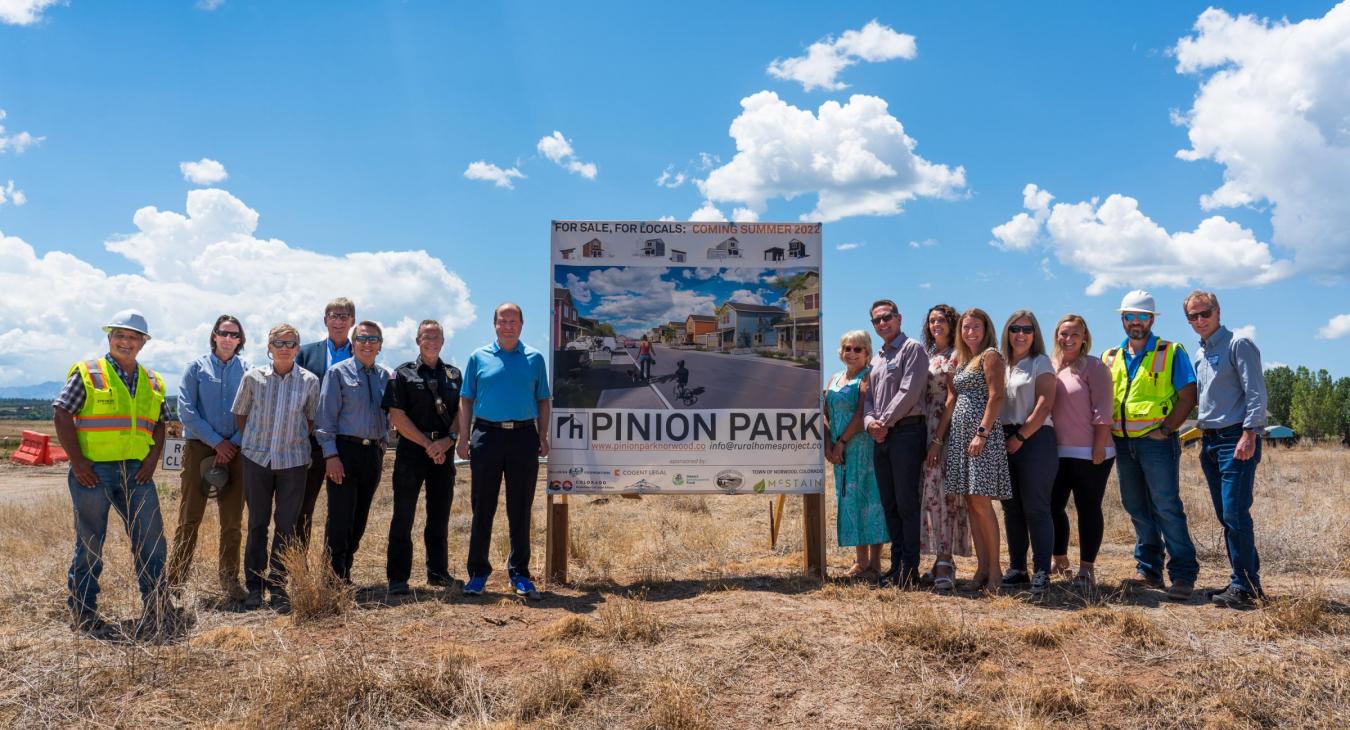Polis Visit to Norwood, CO Affordable Housing Project Reveals Challenges and Solutions
Colorado Governor, Jared Polis paid a visit to the Norwood Lone Cone Library to visit the Pinion Park workforce housing project and participate in two panels concerning local affordable housing.
One panel included Rural Homes Manager, Paul Major, the Colorado Clean Energy Fund (CCEF) CEO, Paul Scharfenberger, and San Miguel Power Association (SMPA) CEO, Brad Zaporski.
The panel presented a new model to build affordable housing in rural communities called “Rural Homes: For Sale, For Locals.” This housing model, an initiative of the Telluride Foundation, is being piloted in Norwood, Ridgway, and Ouray. By integrating donated land, prefabricated panelized home design, low-cost construction finance, and innovative cost recovery into a toolkit, the model restructures the way rural homes can be financed affordably for the region’s essential workforce.
Scharfenberger began by introducing a financing product called “Tariff On-Bill Financing” for moneysaving home upgrades. “The process begins when a homeowner applies to the CCEF, which can provide a low-interest, long-term loan,” explained Scharfenberger. “The contractor then installs the home upgrade, and then the utility, in this case, SMPA, places a tariff on the meter. The homeowner pays their electricity bill, which includes the debt service as a separate line item. Then, SMPA keeps the bill payment and remits the tariff to the CCEF. This unique product provides capital to homeowners who can’t access traditional loans.”
Next, Brad Zaporski, CEO of SMPA told how the program eliminates financing hurdles for ownership of rooftop solar panels and energy-efficient home heating and cooling, which lowers monthly utility bills and carbon footprints without adding to the cost of the home. “It’s a ”win-win-win,” explained Zaporski. “The folks who move into these homes will have a lower bill and an improved quality of life. The community will benefit from added local housing, and we, as the utility, see added grid resiliency as these ultra-high efficiency appliances are paired with solar, and, potentially, energy storage as well.” The cost savings afforded by the SMPA incentives allow the on-bill repayment amounts to remain lower than the electric utility bill would have been without adding the upgrades.
The Governor also heard from Latinx Regional Advocate and Facilitator, María Albañil-Rangel who explained some of the difficulties of buying a home, particular for Spanish-speaking individuals in the region. She introduced two local small business owners, interested in buying homes in Norwood, who face, not only historically high costs, but documentation barriers that many others in the area do not experience.
Lorena Ortiz, interested buyer, local small business owner, and lawful permanent resident, told the Governor, in Spanish, about her experience attempting to buy a home in Norwood and of the difficulties obtaining a traditional loan. Polis, a fluent Spanish-speaker, required no translator to hear her story and to ask questions.
The Governor also heard from Jesús Calvo Rojas, owner of a local painting business and subcontractor for the Pinion Park affordable housing project, near which these panel discussions took place. Like Ortiz, he spoke of his near impossible dream of buying a home despite his lawful residence in Norwood.
Advocate Albañil-Rangel brought forth possible solutions, including navigation help, use of Individual Taxpayer Identification Numbers (ITIN) rather than social security numbers, and Utility, Telecom and Rent (UTR) for mortgage credit scoring, down payment assistance and specialized mortgage products.
Governor Polis responded with praise for the Pinion Park project and its originators. “It’s remarkable to see a project like this, in which pre-fabricated housing is becoming even more competitive and bringing down costs, especially in an area like yours where there is often an extra premium to build. It’s very exciting to see what’s going on here in Norwood.”
About the Telluride Foundation
The Telluride Foundation is committed to enriching the quality of life of the residents, visitors and workforce of the Telluride region. The Foundation does this by development and supporting initiatives and making direct investments that maximize benefit to all, nurture self-reliance and create meaningful change. We provide year-round support to local organizations involved in the arts, education, athletics, health, human services, conservation and other community-based efforts. Through our Impact Initiatives we also tackle critical issues not presently being addressed in our region with a laser focus on where can have a direct and significant impact.
About the Colorado Clean Energy Fund
Colorado Clean Energy Fund (CCEF) is a climate-first investment fund that aims to mitigate climate change, advance environmental and economic justice, and create a healthier and more resilient Colorado by expanding access to capital to underserved projects and communities. This nonprofit financial intermediary identifies barriers to financing clean energy projects, and bridges the gap between clean energy projects and traditional capital providers, while driving demand for these solutions by performing market engagement and development activities. CCEF is based on the Green Bank operating model successfully deployed in other states, but it is customized to address the unique challenges to financing clean energy projects in Colorado.
About the San Miguel Power Association
San Miguel Power Association, Inc. is a consumer-controlled rural electric cooperative with offices in Nucla and Ridgway, Colo. It is the Mission of the San Miguel Power Association, Inc. to provide our members with safe, reliable, cost-effective, and environmentally responsible electrical service, while demonstrating both co-operative responsibility and support for the communities we serve. SMPA serves approximately 10,000 members and 14,000 meters and supports local communities with over $300,000 annually in property taxes, over $100,000 in energy efficiency and renewable energy rebates and over $80,000 in scholarships, community donations and economic development grants.

